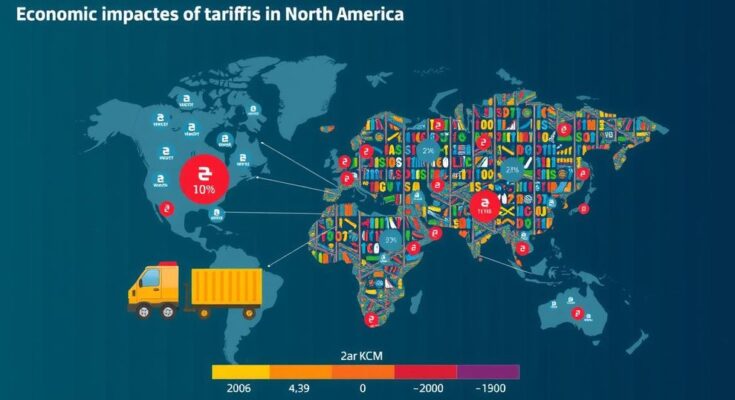President-elect Donald Trump has proposed significant tariffs of 25% on imports from Canada and Mexico, and an additional 10% on Chinese goods, in an effort to combat illegal immigration and drug trafficking. Economists warn that these tariffs may lead to inflation and retaliatory actions from the affected countries, ultimately raising consumer prices for gasoline and groceries. Market reactions indicate cautious optimism, as many view these measures more as negotiation tools than policy mandates.
In a bold move, President-elect Donald Trump has declared intent to impose significant tariffs on imports from Canada, Mexico, and China, asserting that this measure is crucial to counter illegal immigration and drug trafficking. Specifically, he announced a proposed 25% tariff on goods from Canada and Mexico, alongside a 10% tariff on Chinese products, with these tariffs slated to take effect on his first day in office. Such actions, which Trump views as negotiating tactics, could result in markedly increased consumer prices for essential goods, including fuel and groceries, affecting millions of American households.
Experts warn that these tariffs could stimulate inflation and provoke retaliatory measures from the affected countries. Given that Canada, Mexico, and China together account for a considerable portion of U.S. imports, the potential economic repercussions are vast. Mexico, in particular, exports close to 80% of its goods to the U.S. and is vital for fresh produce, while Canada plays a key role in oil supply. Furthermore, the tariffs threaten to undermine the recently established United States-Mexico-Canada Agreement (USMCA), raising legal and diplomatic concerns.
In his communication via social media, Trump stated, “This Tariff will remain in effect until such time as Drugs, in particular Fentanyl, and all Illegal Aliens stop this Invasion of our Country!” Additionally, he reiterated his prioritization of labor issues and trade agreements, fueling speculation about possible parallels with policies from his previous term. Economists also highlighted that his past tariff measures on Chinese imports resulted in increased costs for consumers, with projections indicating that new tariffs could incur an annual expense of over $2,600 for families.
A November report projected that potential tariffs could lead to an increase in consumer prices totaling up to $78 billion, underscoring the substantial economic impact on everyday goods. Despite the potential for legal disputes related to the tariffs, markets reacted cautiously, with initial stability in stock futures, demonstrating that many investors consider Trump’s proclamations as strategic bargaining rather than definitive policy changes.
Trump’s ambitious agenda on tariffs reflects his administration’s longstanding position of prioritizing domestic issues, particularly regarding immigration and border control. His administration’s communication strategy emphasizes the critical nature of tariffs as tools for national security and economic strategy, while proponents and critics alike continue to debate their overall effectiveness. Ultimately, these proposed tariffs encapsulate a high-stakes gamble with far-reaching implications for the U.S. economy and international trade relations.
The topic pertains to President-elect Donald Trump’s announcement regarding the imposition of tariffs on imports from Canada, Mexico, and China, which he argues is a necessary measure against illegal immigration and the influx of drugs, especially fentanyl. The announcement has raised concerns among economists and analysts about potential inflationary effects and retaliatory measures from these countries. Tariffs have historically been contentious as they impact both trade agreements and domestic prices, making the discourse surrounding Trump’s tariffs pivotal for understanding U.S. trade policies moving forward. This situation highlights the complexities of international trade, economic strategy, and domestic policy in the context of Trump’s administration.
In conclusion, President-elect Donald Trump’s proposed tariffs represent a continuation of his administration’s focus on protectionist trade measures, aimed at addressing illegal immigration and drug trade issues. The potential economic ramifications are significant, raising concerns regarding higher consumer prices and possible retaliatory actions from affected countries. As this situation continues to unfold, careful scrutiny of the legal and economic implications of such tariffs will be essential, as they may redefine trade relationships and domestic pricing structures in the United States.
Original Source: www.usnews.com




